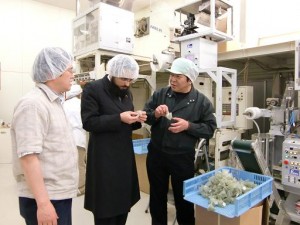Food for Thought and Thought for Food (Part 6)
By Sara Esther Crispe: April 28, 2014: Category Decoding the Tradition, Inspirations
The Journey is as Important as the Destination
 The environment matters. While we are a goal-focused society, how we reach our destination is as important, if not more so, than where we end up. It is during the process that we face choices, make decisions and have the opportunity to rethink if not reroute our plan. And if one thinks that those he or she is associated with along the way or the atmosphere where one is doesn’t have an effect…think again!
The environment matters. While we are a goal-focused society, how we reach our destination is as important, if not more so, than where we end up. It is during the process that we face choices, make decisions and have the opportunity to rethink if not reroute our plan. And if one thinks that those he or she is associated with along the way or the atmosphere where one is doesn’t have an effect…think again!
In understanding the laws of keeping kosher, the end product is the food that will be eaten. We are what we eat, or more appropriately, what we consume. So to know what that end product is that we are going to digest, it is important to understand and trace how it came to be.
When I was in college I backpacked through Egypt. It was an incredibly educational experience allowing me to take in the sights, history and culture of its ancient land and people. Yet as much as I tried to partake of all it had to offer, there was one thing I stayed far away from…the water. And it wasn’t just that I didn’t drink the water but that I ensured I didn’t eat anything that had come near it. For the water came from the Nile River and there was no question that a body not used to the parasites, dirt and toxins would react violently to it. Therefore any contact with water that had not been properly boiled would lead to severe illness.
So how was one to know what had been rinsed with the water? The bottom line was that you couldn’t. There was no one who could guarantee what had come into contact with the water, so to protect yourself you had to avoid anything that had not been cooked. This meant no fruits or vegetables that you couldn’t peel, and most definitely no salads. Basically if I didn’t cook it myself, I didn’t touch it.
And that is the point. When it comes to trusting what is eaten, one must trust how it was made and what the contents are. While the end product might look appetizing, sometimes when you see how it got there you would never think of putting that food in your body. Keeping kosher ensures that we examine not only the ingredients from a health standard but also from a spiritual perspective. Spiritually it is not only the ingredients that count but the combination and preparation can take kosher products and render them extremely problematic and therefore spiritually unhealthy for consumption.
When the most kosher of milk and the most kosher of meat are cooked together they are then forbidden. Or if that kosher food is cooked in a non-kosher oven or pan then likewise they can’t be eaten. The environment affects the food. The environment affects our lives.
This can be seen from the physical to the emotional to the spiritual. Think about second-hand smoke. Research shows that one who is around a smoker has a significant amount of damage to his or her lungs, even though that person may not have personally smoked a cigarette. But when we are around something unhealthy, even indirectly, it can damage us directly. Just the other day the Orthopedist asked me if there was a smoker in the home. I couldn’t understand how smoking would be related to a broken wrist but she explained that research shows that when children live around second hand smoke that the healing process takes significantly longer.
When it comes to food preparation, cooking experts also teach how the materials used to prepare the food will affect the food. There is a reason you can buy a pot for $5 or for $500 as the quality of the pot will impact the quality of the food. And more so, if the utensil has something in its coating that is unhealthy it can seep into the food thus creating toxins that we don’t want to consume. Spiritually this is what a kosher cooking process is teaching as well. The residue of the containers in which the food is prepared will absolutely effect the outcome of that food. Therefore if meat and milk must be separated, they cannot be eaten together, they cannot be cooked together and a milk product cannot even be cooked in the same vessel that previously cooked meat and vice versa. Separation must be maintained from beginning to end.
Yet there is one way around this. There is a process by which kosher food can be taken and placed it in a completely non kosher oven or cooking vessel. And the process can most definitely be applied to our lives in many ways.
When food is double wrapped, it can enter any environment and utilize the good while not being affected by what isn’t kosher. One can therefore, for example, take a pan of food and envelop it in two layers of aluminum foil, and then place it in an oven that had just cooked non-kosher food. The pan will still be heated by the oven and the food inside the pan will cook, but the environment of the oven which is problematic will not be able to seep in and affect the food for it is completely protected.
In life there are times we need to enter into situations that are toxic. We know they are not healthy but at least temporarily we need to be around or within them. The mistake we can make is thinking that we can do so without any buffer. That we are strong enough or wise enough and can go in and come out unfazed. But we can never underestimate the power of that environment. If we want to enter and maintain who we are, our sense of identity and our health, we must ensure we are completely sealed within not just one but two protective layers so that we affect our environment but that the environment does not affect us.
But what happens when we are not even able to be part of the process of creating what we ultimately consume? What if we are only able to see the end result? How can we trust that it was prepared properly? That the ingredients are those we want to become part of us? This is where transparency is essential.
It used to be that when someone bought a food product there was not necessarily any real understanding of what it contained. If the wrapper said “natural” we were to assume it was natural. But what is “natural?” What if our definition differs from that of the person who made the claim? In today’s day and age, with a significantly advanced health consciousness, food providers have become more and more responsible to own up and admit exactly what is in the food they have made. We now have a thorough list of ingredients and allergy sensitivities listed. We are more informed if GMO products are used or trans fats, if there is gluten or dairy in the food.
While this is still up and coming for food in general, when it comes to kosher food it is something that we have had for some time. Since we cannot possibly know by looking at a final product what is contained within, there have always been those trusted to objectively determine if the food is kosher. Kosher agencies have been employed to create a sense of transparency—to supervise and research the facilities so that they can guarantee the consumer that both the ingredients used and the process by which the food was prepared is up to our standards.
But they can only do this if they are independent. Someone who has something to gain by either allowing or not allowing a food to be sold is problematic. This is why a kosher agency cannot work for a food company but rather works alongside it. The agency makes random checks that are unannounced for it is vital that things be done properly all the time, not just when someone comes to inspect.
 Therefore when we see a kosher symbol on a food we can know definitively that there is nothing in the ingredient list that has not been reviewed, that there is nothing in the cooking process that is problematic and that from start to finish the environment has been kept up to standard.
Therefore when we see a kosher symbol on a food we can know definitively that there is nothing in the ingredient list that has not been reviewed, that there is nothing in the cooking process that is problematic and that from start to finish the environment has been kept up to standard.
The lesson for us is that before we allow something to become a part of us, before we consume it, digest it and let it affect us, we should ensure that every ingredient is going to be physically and spiritually healthy for us, that the mixture and atmosphere did not negatively affect it and that what it says it is, is actually what it is.
As they say in Hebrew, beteiavon…we should have a healthy appetite for the right things, in the right way, at the right time. And may all we consume give us the strength, energy and inspiration to impact the world in the way that only we can.
http://www.interinclusion.org/inspirations/thought-for-food-and-food-for-thought-part-5/
http://www.interinclusion.org/inspirations/food-for-thought-and-though-for-food-part-1/

















;)
;)
;)
;)
;)
;)
;)
;)
;)
;)
